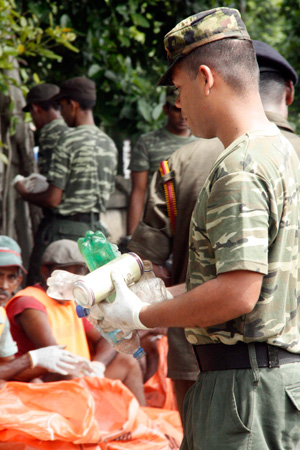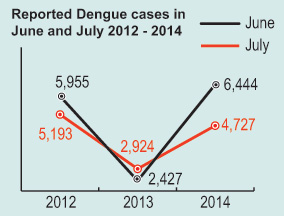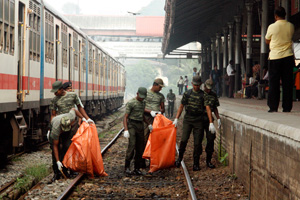News
Dengue campaign re-starts on Thursday
The dengue prevention campaign headed by the Presidential Task Force will continue on August 7, 8, 18 and 19, particularly focusing on high-risk areas of the Western Province , the Sri Lanka Epidemiological unit said. Senior Consultant Epidemiologist, Dr Hasitha Tissera described this campaign as a “mop-up of the high-risk areas” and said the team would also focus on other potential dengue mosquito breeding areas.

Army personnel continue their battle against dengue. Pic by Indika Handuwala
The Chief Epidemiologist and Director of the Central Epidemiological Unit, Ministry of Health, Sri Lanka, Dr Paba Palihawadana, has noted a drop in the number of dengue cases reported throughout the island following the campaigns. “Currently the threat pertains in the Western Province and other districts such as Kandy, Kurunegala and Ratnapura,” she said.
 “There have been about 55 deaths this year and one death was reported last month, so the situation is not bad.”
“There have been about 55 deaths this year and one death was reported last month, so the situation is not bad.”
“Our main objective is to reduce the number of deaths,” said Dengue Control Unit- spokesperson Dr. Nayana de Alwis.
“The hospitals are also flooded with patients during an outbreak and such situations are difficult to manage.”
She said the situation was “mostly under control” but that the campaign should continue at least until the monsoon period ended.
The Chief Medical Officer of the Colombo Municipal Council (CMC), Dr. Ruwan Wijayamuni said he was planning to make the NS1 antigen test available in all dispensaries. “Although this is a costly affair I think it is a necessity,” he said.
“Currently the test is a full blood count that checks whether the white blood cells and the platelet count go down. This is not a very good test because all viral infections can result in the same thing. So you cannot really distinguish whether this is a dengue case or not. But that was the only test we had earlier,” he said.
The NS1 antigen, which is specific for dengue is a highly sensitive to dengue. It shows 90-92 percent accuracy during the very first day. Earlier a person had to wait for three days before going to a hospital.
“If the NS1 test is positive you can tell with 90-92 per cent accuracy that the person has dengue. But this specificity goes down as time passes. So the earlier the diagnosis the better. In dengue management it is very important that you diagnose a person early. Then you can direct him to a specialised government unit.”
Commenting on the dengue situation in Colombo, Dr. Wijayamuni said, “Dengue cases are coming down in the City of Colombo. Up to July 31, 403 cases were reported. There is a reduction of 95 cases in comparison with the figures for last year.”“The way that it took off we thought that we will end up with 600 cases or so, but we managed to reduce it. We changed the strategy: outdoor fogging was stopped, indoor fogging was started, with residual spraying. Mass campaigns where the entire city was covered in eight days with over 18,000 troops helped.
“The question however is how we sustain this. With the rain and the peak in December we cannot loosen our grip.”
The dengue high-risk areas in the Colombo District are Mahawaththa, Modara Mattakkuliya, Grandpass, Maligawatta, Narahenpita, Kirulapone and Wellawatte.


